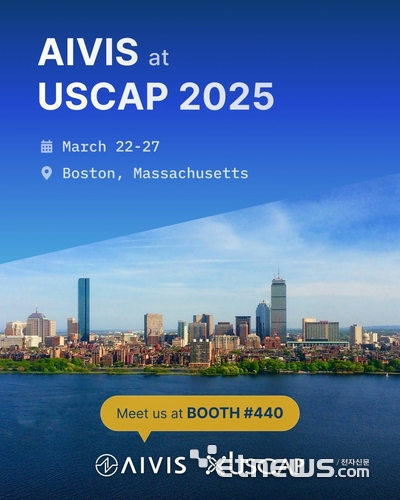AIVIS to Present Four AI-Based Pathology Research Outcomes at USCAP 2025
etnews
March 21, 2025

AIVIS (CEO Lee Daehong) announced on the 21st that it will present four latest research outcomes utilizing its AI pathology solution at USCAP 2025, held at the Boston Convention Center from the 22nd to the 27th. USCAP, the United States and Canadian Academy of Pathology, is North America’s largest pathology conference with over a century of history, where leading pathologists and industry professionals from around the world share cutting-edge research findings. The presentations will cover various cancer types applying AI technology. In thyroid cancer research, two results will be shared that classify core needle biopsy slide images with high accuracy between benign and malignant cases. Notably, the study incorporating tissue contour information achieved an average AUC of 94.72% and an F1-score of 89.18%, reflecting a 5–10% improvement in performance compared to previous methods. Both studies demonstrated high concordance between the algorithm-generated attention heatmaps and the regions identified by pathologists, proving their clinical applicability. In the field of invasive urothelial carcinoma, significant results regarding prognostic prediction will also be presented. AIVIS’ proprietary AI model predicted muscle invasion with 80% accuracy and assessed recurrence risk with 71.43% accuracy. While it has traditionally been challenging to precisely determine the depth of invasion, the application of AI in pathology offers practical support for treatment decisions by providing a more detailed interpretation of tissue. In renal pathology, a virtual staining technology that converts H&E images into special stain images using generative AI will be introduced. This research synthesized PAS, AFOG, and PM stained images, recording similarity scores between 0.72 and 0.87, thus demonstrating that the generated images can reproduce structural information comparable to actual staining. A notable aspect of these presentations is the system’s capability to automatically analyze digital pathology images, highlight key regions, and reduce diagnostic time without overlooking critical information. Some studies also showcased virtual staining—implementing various digital stain images—which holds the potential to reduce both time and costs in the pathology diagnostic process while maintaining high precision. AIVIS has completed the deployment and PoC of its digital pathology solution in collaboration with over 20 major medical institutions in Korea and is currently supporting accurate cancer tissue analysis and biomarker quantification through its MFDS-approved ‘Qanti IHC’. In addition, the company is conducting AI pathology research in the fields of companion diagnostics (CDx) and new drug development in collaboration with global medical device companies such as Philips and pharmaceutical giant AstraZeneca, while also expanding its market presence in the ASEAN region. Lee Daehong, CEO of AIVIS, stated, “USCAP is one of the most prestigious academic conferences in pathology. Through these four research outcomes, we aim to showcase the competitive strength of AIVIS’s AI pathology technology to the global pathology community and contribute to advancing the era of precision medicine.”